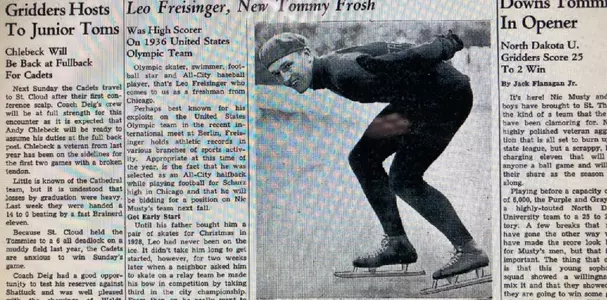University of St. Thomas Athletics

Throwback Thursday: Tommie legends raced to on-ice medals
1/6/2021 2:25:00 PM | Athletics
A fun 20th century chapter at St. Thomas recalls several world-class speed skaters from our student body.
The Tommies' three most decorated skaters were:
-
World champion skater and future pro hockey player Everett McGowan;
-
U.S. Olympic skater and later Olympic coach Leo Freisinger;
-
Two-time Olympic skater and silver medalist Bobby Fitzgerald.
Everett McGowan
A graduate of St. Paul's Humboldt High, McGowan attended St. Thomas from 1919-21. Despite standing only 5-foot-7, he made an impact in baseball; as a middle distance man in track and field; and as a running back and kick returner in football. He's written up in the Aquinas yearbook in that era for a memorable punt return for a touchdown against the North Dakota Aggies (now North Dakota State).
He won the Northwest and U.S. amateur skating crowns. He is one of the few skaters ever to beat legendary skater and record holder Norval Baptie.
According to the IMD website, McGowan considered joining a friend who played football at Notre Dame and seeking a tryout with Coach Knute Rockne. But his skating career took off that year when he won the 1920 national and international speed skating crowns as an amateur. He also played pro hockey between 1924-30 in both the Western Canadian League and American Hockey Association for the Vancouver Maroons, Winnipeg Maroons, Edmonton Eskimos and Springfield Indians. He had a short stint as a welterweight boxer in 1921 under Paddy Mullin. He even played semipro baseball as a shortstop and outfielder in the Dakota and Iowa leagues.
McGowan was inducted into the National Speed Skater Hall of Fame in 1962, and in 1972 was inducted into the ISI Ice Skating Hall of Fame.
Leo Freisinger
A Chicago native, Freisinger was just 19 years old when he competed as a 1936 Olympian and won a bronze medal at 500 meters and took fourth at 1,500 meters in the Olympic Games in Bavaria, Germany.
He had overcome a broken leg that sidelined him for one season and came back to make the Olympic team when the 1936 trials races were held near the Tommie campus across the river at Minneapolis' Powderhorn Park.
Freisinger went on to enroll as a student at St. Thomas in 1937 at age 21. An All-City honoree in football and baseball at Chicago's Schurz High, Freisinger was a natural athlete. An Aquin newspaper story said he won the Illinois state amateur bicycle championship for unattached riders, and spent summers working as a life guard. He played one season of football in 1937 for the Tommies but had to give up the sport in 1938 to continue his international skating career.
He qualified for the 1940 Olympic team but the event was cancelled due to World War II. He later won U.S. national titles in 1937 and 1938 (indoors) and 1940 (outdoors). He went on to coach the 1964 U.S. Olympic team, and later was inducted into the National Speedskating Hall of Fame. Later in his career after World War II he also was a performer in the early days of the touring Holiday on Ice shows.
Freisinger died in his sleep at age 69 in Mission Viejo, Calif, in 1985. His obituary said he established the world record for 500-meter speed skating in 1938 at 41.9 seconds -- a record that was not broken for 18 years.
Bobby Fitzgerald
The Minneapolis South High grad was a 1948 silver medalist at the Olympic Games in St. Moritz, Switzerland. He was involved in a rare three-way tie for second place at the Games, with identical 43.2 times for the 500 meters. He qualified for the event by winning the trials race held at St. Paul's Como Park.
Fitzgerald would go on to compete in the 1952 Olympic Games in Oslo, Norway.
Fitzgerald overcame an injured back suffered in World War II with the Army Air Corps. Before leaving school to serve in the war in December 1942, Fitzgerald also was catcher in baseball and a track and field runner for St. Thomas. As a Tommie student he skated for the Powderhorn Skating Club and broke a world record in the 880.
He later received a degree at Northwestern Chiropractic College and worked as a chiropractor -- a career inspired in part by his own chiropractic treatments that helped him recover from his WW II back injury.
In his 2005 Star Tribune obituary, his wife, Dr. Judi Fitzgerald, said Bobby got involved in speed skating "because it was a way to travel and get three square meals a day during the (1930s great) Depression."













